The Great Courses Plus Archaeology: An Introduction to the World’s Greatest Sites
12.30 GB
VIDEO + AUDIOBOOK + PDF GUIDEBOOK
Produced in partnership with National Geographic, and led by a renowned archaeologist, explore over 20 of the most significant and enthralling archaeological sites on the planet.
_https://www.thegreatcoursesplus.com/archaeology-an-introduction-to-the-worlds-greatest-sites
1: The Origins of Modern Archaeology
- Begin to investigate what archaeologists actually do, the nature and scope of their work, and popular misconceptions about the field. As an introduction to the course, trace the colorful history of archaeology from its beginnings with the ancient Babylonian king Nabonidus to archaeological luminaries of the 20th century….
2: Excavating Pompeii and Herculaneum
- Travel to the iconic sites of Pompeii and Herculaneum in Italy-Roman towns that were famously destroyed by the 79 A.D. eruption of Mount Vesuvius. Learn about the history of their excavation, and witness the astonishing preservation of buildings, objects, and human remains. Delve deeper to discover fascinating details of ancient Roman life….
3: Schliemann and His Successors at Troy
- Follow the exploits of Heinrich Schliemann, a 19th-century amateur archaeologist who was determined to find the site of Homer’s Troy. Learn about his dig through nine stratified cities, the astonishing finds, and the intense debates concerning which city was the actual Troy. Trace subsequent work at the site and examine the compelling conclusions….
4: Early Archaeology in Mesopotamia
- Explore the history of phenomenal finds in Mesopotamia, beginning with the 19th-century unearthing of the great Assyrian palaces at Nimrud and Ninevah, with their libraries of cuneiform texts. Also contemplate the 20th-century discovery of the dazzling treasures of the famous “Death Pits of Ur.”…
5: How Do Archaeologists Know Where to Dig?
- This lecture uncovers the methodology archaeologists use in looking for sites. Get acquainted with the uses of remote sensing technologies, such as LiDAR and ground penetrating radar, which enable archaeologists to visualize objects obscured by vegetation and soil. Then investigate ground surveys-reconnaissance done by carefully walking potential sites-which reveal vital information before digging…
6: Prehistoric Archaeology
- Prehistoric archaeology allows us to glimpse the earliest times in hominid and human history. Learn about seminal 20th-century finds of hominids in Africa, which provided clues to the origins of our ancestors from millions of years ago. Then discover the astounding figural cave paintings of Lascaux, Altamira, and Chauvet….
7: Gobekli Tepe, Catalhoyuk, and Jericho
- Among significant Neolithic (New Stone Age) sites, explore Göbekli Tepe in Turkey, whose imposing stone rings are the oldest known examples of monumental architecture in the early Near East. Continue to Jericho, with its extraordinary tombs and famous tower, and Turkey’s Çatalhöyük, noted for its mysterious houses built without doors or windows….
8: Pyramids, Mummies, and Hieroglyphics
- In the first of two lectures on the wonders of Egyptology, learn about the deciphering of hieroglyphics through the legendary Rosetta Stone. Also explore the intriguing techniques of ancient Egyptian embalming and mummification, and get the stories behind the building of the Step Pyramid of Zozer, the Pyramids at Giza, and the Sphinx….
9: King Tut’s Tomb
- Trace the events that led Egyptologist Howard Carter to the dramatic discovery of King Tutankhamen’s tomb in 1922. Witness the unfolding excavation of the site, and uncover the spectacular treasures of the tomb. Consider why the tomb of a young and short-lived king might have contained such a vast display of wealth….
10: How Do You Excavate at a Site?
- Here, delve into the specifics of how to perform an archaeological dig. Learn about the physical tools of the trade, how to excavate objects in the ground, and how a dig’s schedule unfolds. Learn about strategies in the field such as “vertical” and “horizontal” excavations, and walk through the process of organizing an archaeological project….
11: Discovering Mycenae and Knossos
- Follow the archaeological search for King Agamemnon at Mycenae, and ponder the discovery of striking tomb objects as well as the palace from which the Mycenaeans sailed for Troy. From there, uncover the majestic palace of the Minoans at Knossos, with its vibrant wall paintings and perilous court rituals of bull-leaping….
12: Santorini, Akrotiri, and the Atlantis Myth
- Visit the famously beautiful Greek island of Santorini, whose picturesque topography resulted from a volcanic eruption in the second millennium B.C. Explore the site of Akrotiri, a town buried under volcanic ash, renowned for masterful wall paintings reflecting ancient Aegean trade. Trace intriguing connections between the volcano’s destruction and the myth of Atlantis….
13: The Uluburun Shipwreck
- The Uluburun shipwreck, a vessel that sank in 1300 B.C. off the coast of what is now modern Turkey, ranks among the greatest archaeological finds of all time. Learn about its remarkable underwater excavation, and wonder at the ship’s fabulous cargo, from ancient raw materials such as copper ingots and ivory to lavish finished goods and dazzling jewelry….
14: The Dead Sea Scrolls
- The unearthing of the Dead Sea Scrolls revolutionized the field of biblical studies. Investigate the events that led to their discovery in 1947, and consider their extraordinary contents, which shed light on the Hebrew Bible through texts from over 2,000 years ago. Learn also about the fascinating finds in other nearby caves….
15: The Myth of Masada?
- The excavation of Masada-the ancient mountain stronghold of Jewish rebels against Rome-was a milestone for archaeology. Explore the discoveries at the site, hear the harrowing story of its defense, and contemplate the controversy surrounding the use of a first-century historical account in interpreting the archaeological evidence….
16: Megiddo: Excavating Armageddon
- The site of Megiddo in northern Israel comprises more than twenty ancient cities, built one atop the other. Trace the excavations there over the last century, and examine the discovery of Neo-Assyrian palaces, lavish Bronze Age tombs, monumental temples, and other treasures at one of the most important archaeological sites in the Near East….
17: The Canaanite Palace at Tel Kabri
- Enjoy a firsthand look at archaeological fieldwork as Professor Cline recounts his own excavations at Israel’s Tel Kabri. Follow the work at the site from 2005 to 2015, centering on an elaborate Bronze Age Canaanite palace, its striking architectural features, and the oldest and largest wine cellar ever discovered in the ancient Near East….
18: Petra, Palmyra, and Ebla
- Here, visit three superlative sites in Jordan and Syria. Begin at Petra, with its breathtaking tombs and temples carved into the face of cliffs. At the desert oasis of Palmyra, explore the site’s extraordinary Greco-Roman and Persian architecture. Finish at the great citadel of Ebla, famous for its enormous cache of ancient tablets….
19: How Are Artifacts Dated and Preserved?
- Observe how the measurement of factors such as electromagnetic radiation, hydration, and carbon content can reveal the age of excavated objects. Examine how particular environmental conditions can preserve organic material over centuries or millennia. Finally, take account of the looting of antiquities and its impact on the world’s archaeological heritage….
20: The Terra-cotta Army, Sutton Hoo, and Otzi
- Among the more unusual archaeological finds, investigate the accidental discovery of China’s terra-cotta army, with its spectacular clay warriors, horses, and chariots. Ponder the “accidental preservation” of a 7th-century ship at Sutton Hoo in England, and conclude with cases of remarkable preservation of human remains in bogs, ice, and desert environments….
21: Discovering the Maya
- Trace the unearthing of the great Maya civilizations in the 19th century, and revel in the excitement of the recent “cracking” of Maya hieroglyphics. Contemplate the extraordinary temple-pyramids, tombs, and athletic courts of the Maya; consider the use of remote sensing technology in uncovering Maya structures; and explore the premier sites of Copán, Palenque, Tikal, and Chichén Itz…
22: The Nazca Lines, Sipan, and Machu Picchu
- Continue with three stellar South American sites: First, ponder the mysteries of the Nazca Lines, giant animal and human figures etched in the soil of the Peruvian desert. Then visit the New World’s richest unlooted tomb, that of the “Lord of Sipán,” and finish at Machu Picchu, glorious city of the Incas….
23: Archaeology in North America
- Journey into the archaeological heritage of North America, beginning with the excavation of the Hunley, a Confederate submarine from the U.S. Civil War. Investigate the unearthing of colonial Jamestown, Virginia; consider the impact of the 9,000-year-old “Kennewick Man”; and learn about legislation enacted to protect archaeological finds in the U.S….
24: From the Aztecs to Future Archaeology
- Finally, travel to the site of Tenochtitlan, buried under modern Mexico City, and to Teotihuacan, with its vast pyramids and temples along the Avenue of the Dead. Conclude the course by considering how future archaeologists may interpret our own culture someday, and reflect on archaeology’s contributions to our collective knowledge and our humanity….
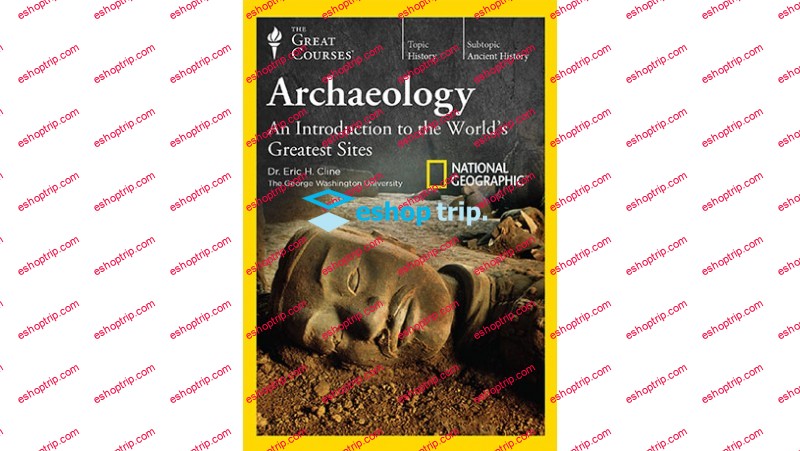


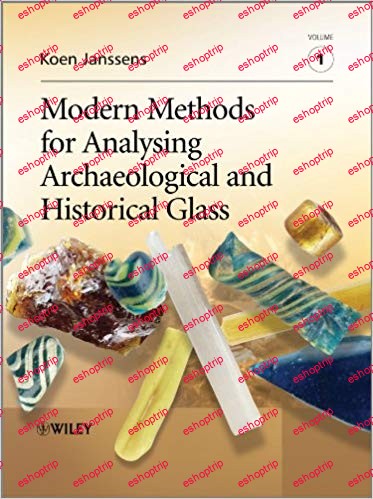
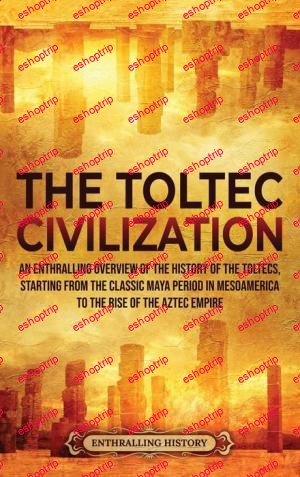
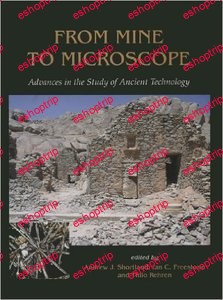

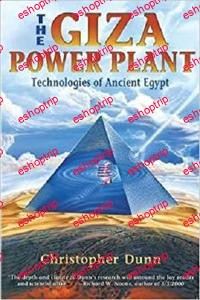
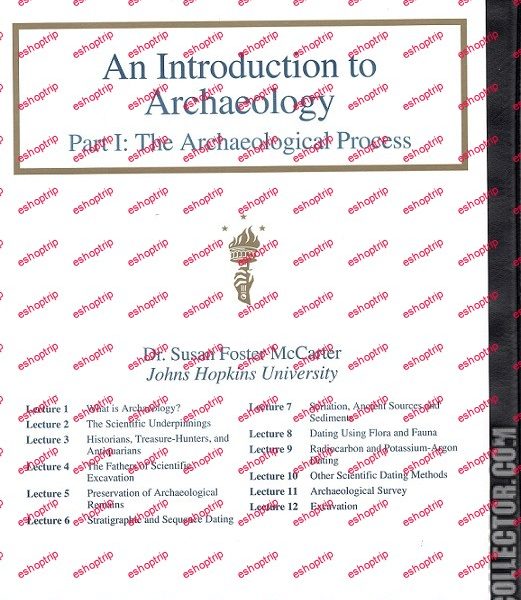
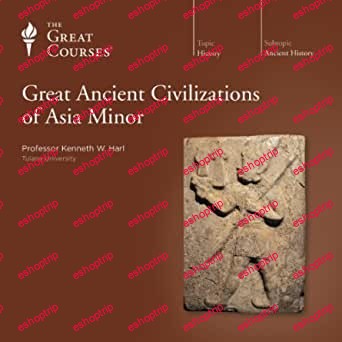
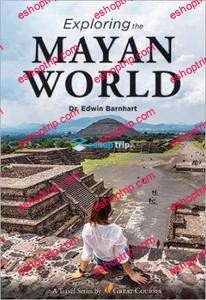
Reviews
There are no reviews yet.